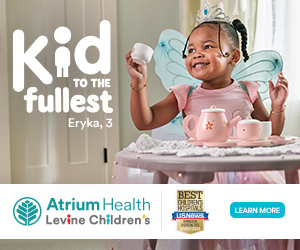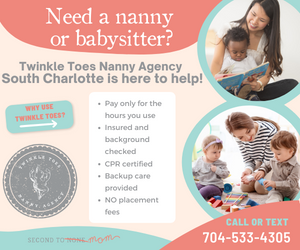This article was previously published on Atrium Health's Daily Dose
Broaching the topic of THC (tetrahydrocannabinol, or commonly known as marijuana) and vaping with your child may feel a bit intimidating, and the rise of vaping and the increased availability of marijuana-infused products have added additional layers of complexity to these conversations. Our experts with Atrium Health Levine Children's offer their insight on the risks of these substances, strategies for parents to proactively address and prevent substance use, and effective approaches for intervention.
Encourage Open Dialogue
As your teen goes through the ups and downs of adolescence, it's important to keep the lines of communication open. Dr. Shamieka Dixon says to begin the conversation about substance use early. This establishes an atmosphere of trust, making it easier for your kids to approach you with questions or concerns along the way.
Use age-appropriate language and tailor your discussions to their level of understanding. Dixon says it's also important to create space for open dialogues with your teen about healthy ways to handle stress, anxiety or depression instead of using marijuana or vaping.
Chelsea Cain, a family nurse practitioner with Atrium Health, says it's important to create a non-judgmental and safe space for your child to ask questions. Emphasize that your goal is to ensure their safety and well-being, not to pass judgment. Encourage them to ask questions and listen actively to their thoughts and concerns. Cain says these honest conversations are crucial for fostering a healthy relationship with your child and can help them make informed decisions in the future. Cain also suggests using The American Lung Association's Vaping Conversation Guide as a resource for having productive conversations with your teen around substance use.
As the saying goes: it's a marathon, not a sprint. This is not a one-and-done conversation. It's an ongoing process, and your willingness to engage with your child will strengthen your relationship and contribute to their overall well-being. Check in regularly and let your teen know you're in their corner.
Address Misconceptions
Many kids who start vaping think they are just inhaling flavor-infused water vapors, but they don't realize how addictive – and harmful – it can be. Dixon says many people don't realize that one standard e-cigarette pod has 20 cigarettes, which is equivalent to a whole pack.
Cain says the terms 'vapor' or 'aerosol' are misleading, making consumers think it is merely water.
"Two thirds of teens don't even realize that e-cigarettes contain nicotine," Cain says.
Manufacturers claim the flavorings are safe for consumption based on the U.S. Food and Drug Administration's "generally recognized as safe" (GRAS) designation. But Cain explains that designation only applies to food, not what is inhaled into the lungs.
"All these flavors in e-cigarettes may be considered generally safe to ingest or eat, but not to heat up and breathe deep into lung tissue," Cain says.
Know the Risks
Dixon explains that short-term marijuana use can impact short term memory, leading to poor school performance, slow reaction times when driving, anxiety and paranoia. Long term chronic use leads to higher dropout rates and amotivational syndrome, which makes it hard to accomplish one's desired goals academically or professionally.
Cain says nicotine is particularly dangerous before the brain is fully developed, which is typically around age 25. It can lead to problems with concentration, learning and impulse control, and can also rewire the brain in ways that allow dependence to other drugs to happen more easily.
Additionally, Dixon says the use of synthetic forms of marijuana – such as Delta-8 tetrahydrocannabinol, also known as delta-8 THC – can also be dangerous, with the risk of increased anxiety and sometimes psychosis in adolescents.
The risks for marijuana and vaping can also include exposure to secondhand smoke. Whether it's from family members inside the home or friends and extended family members at social gatherings, secondhand exposure to nicotine from vaping is associated with an array of negative health outcomes.
Help Them Feel Prepared
Dixon says in addition to being honest with kids about the dangers of vaping and marijuana use, it's essential to equip them with effective communication strategies and the confidence to resist peer pressure. This can help empower them to take control of their safety in various social situations.
You can help your teen develop their own script for how they will say 'no' when approached. It doesn't have to be an elaborate response. They can just keep it simple by saying something like: "No thanks, I'm not into that." Or "Nah, nicotine gives me a headache."
You can also help them plan a quick exit strategy if they ever need to leave a party or activity because of drug use. This could be a code word or phrase that wouldn't attract unwanted attention, but something your teen can text or say to signal that they need to leave discreetly.
Keep an Eye Out for Signs
Vaping is easy to hide. Unlike traditional cigarettes, e-cigarettes don't leave the telltale scent of tobacco. Dixon encourages parents to increase their awareness about the range of devices that allow people to vape undetected. Vaping devices can mimic pens, USBs, phone cases – even hoodies and backpacks are upfitted to hold vaping products.
Cain says signs that your child is vaping can be easy to miss. If you notice any of the following things, talk with your teen about whether they are vaping or using marijuana.
- Presence of unfamiliar technology, online purchases, or packaging
- Faint sweet or fruity scents
- Behavioral and mood changes
- Increased irritability or restlessness
- Cutting back on caffeine
- Desire for flavor due to tastebud degradation
- Pneumonia
- Increased thirst
- Nosebleeds
Cain says youth can develop very strong nicotine addictions from vaping, making it hard to quit. The best way to help your child quit is to be supportive and get them the help they need.
Your role as a parent is not only to protect, but also to guide and support your child as they make choices that shape their future. While it may feel difficult at times, building a foundation of trust and maintaining open communication will empower your child to navigate the complex landscape of substance use responsibly.
To connect with a caring provider and help your teen thrive, find an Atrium Health Levine Children's pediatrician near you.






















